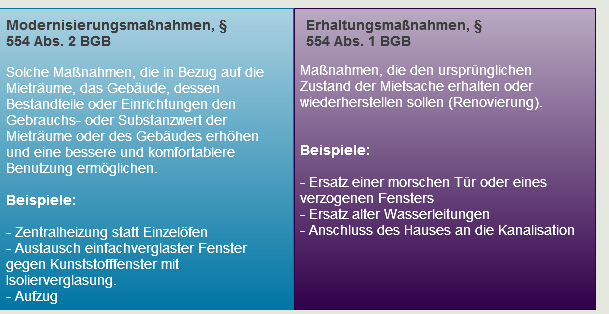Federal Court of Justice, 10.10.2012, Ref.: VIII ZR 25/12
If the landlord plans to carry out modernisation measures on the rented property, he cannot start these measures at his own discretion.
Pursuant to Section 554 (3) sentence 1 BGB, the landlord is instead obliged to notify the tenant of the planned measures in text form (e.g. by letter, fax or email) at least 3 months before commencement.
The announcement must contain the following elements:
1. type, start and scope of the planned modernisation measures,
2. the expected duration of the work
3. and the expected rent increase.
This obligation to give notice applies both to modernisation measures inside the flat and to measures outside the flat if the landlord later wishes to demand a rent increase for these measures.
If the start of the modernisation measures is significantly delayed after the first announcement or if other circumstances of the modernisation change significantly after the first announcement, the landlord must repeat the announcement.
If the landlord starts a modernisation measure without giving notice, the tenant may not be obliged to pay a rent increase resulting from the measure.
However, if the tenant tolerates the measure despite being aware of it, the tenant cannot later invoke the lack of notice.
Modernisation measures must be distinguished from so-called maintenance measures (renovation).
This distinction is particularly important because pure maintenance measures are not apportionable, meaning that the costs are to be borne by the landlord alone.
Of course, the tenant is not obliged to tolerate all modernisation measures carried out by the landlord.
Pursuant to Section 554 (2) sentence 2 BGB, there is no obligation to tolerate the measure in particular if the measure would cause hardship for the tenant, his family or another member of his household that cannot be justified even when taking into account the legitimate interests of the landlord and other tenants in the building.
This would be the case, for example, if the landlord is planning a luxury modernisation that results in an above-average standard of the rental property, which is accompanied by an equally above-average rent increase that the tenant cannot bear economically.
According to Section 554 (2) sentence 4 BGB, however, the expected rent increase in such cases is not to be regarded as hardship if the rented property is merely restored to a condition that is generally customary.
In the above-mentioned ruling of the Federal Court of Justice, it had to deal with the question of the basis on which it is to be assessed whether a modernisation measure planned by the landlord puts the rented flat in a generally customary condition.
Facts of the Case:
Defendant had rented a flat equipped with a stove and Gamat heater
In this case, the defendant had rented a flat in Berlin Mitte from the plaintiff's legal predecessor in 1989, which was equipped with a single stove and a Gamat heater.
Landlord installed a new gas heating system and sued the tenant for connection of the same
In 1991, with the agreement of the then landlord, the defendant installed a gas-fired central heating system at its own expense. In a letter dated 17 November 2009, the plaintiff unsuccessfully requested that the defendant tolerate the connection of the flat to the central heating system that had been installed in the building in the meantime.
The local court dismissed the action for acquiescence. On appeal, the regional court amended the judgement of the court of first instance and upheld the claim.
Judgement of the Federal Court of Justice
The defendant's appeal, which was authorised by the Court of Appeal, was successful.
Tenant argued that the modernisation meant unreasonable hardship for her
The BGH ruled that the defendant's objection that the modernisation represented an unreasonable hardship for them in view of the expected rent increase could not be countered in accordance with Section 554 (2) sentence 4 of the German Civil Code (BGB) by the fact that the connection to the central heating system would merely restore the rented flat to a condition that is generally customary.
This is because the basis for the assessment is not the condition existing at the time of the rental (with a single stove and a Gamat heater), but the current condition including the changes lawfully made by the tenant.
The court of first instance would have to re-examine whether the gas-fired central heating system met a generally accepted standard
In the interests of improving general living conditions, the provision in Section 554 (2) sentence 4 BGB is intended to prevent modernisation that merely achieves a generally accepted standard from being omitted for reasons of personal hardship.
This objective requires taking into account a condition lawfully created by the tenant that already meets this standard.
The Federal Court of Justice therefore referred the case back to the Court of Appeal so that it could examine whether connecting the defendant's flat to the central heating system would lead to energy savings compared to the existing situation (gas-fired floor heating) and whether there was hardship within the meaning of Section 554 (2) sentence 2 BGB.
Source: Federal Court of Justice
Important Note: The content of this article has been prepared to the best of our knowledge and belief. However, due to the complexity and constant evolution of the subject matter, we must exclude liability and warranty. Important Notice: The content of this article has been created to the best of our knowledge and understanding. However, due to the complexity and constant changes in the subject matter, we must exclude any liability and warranty.
If you need legal advice, feel free to call us at 0221 – 80187670 or email us at info@mth-partner.de.
Lawyers in Cologne provide advice and representation in tenancy law.

